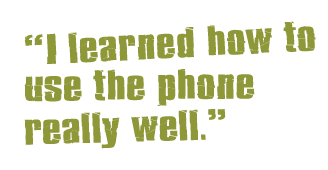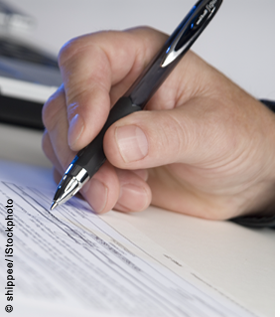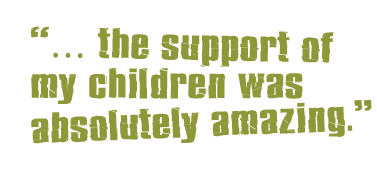I grew up in Cobourg, Ontario. There was a lot of bullying back then […] and when you were having struggles in school that didn’t help. I went to the teachers, I went to the principal and asked for help, and I was told I didn’t need it. So I was overlooked, and it was quite devastating. It destroyed me [...]. I had to go from there and accept the fact that they figured I didn’t need help, when I knew I did. It just made life as a child growing up very difficult [...].
I’ll never forget the day. I was in grade 8 at the time, and [the teacher] threw a grade 5 speller on my desk and said, “You’re at that level and that’s where you’ll do it.” She humiliated me in front of the whole class […]. That was my last real year of school.
 What happened after you left school?
What happened after you left school?
I got married. From there, I had five children.

How did you cope in your daily life?
I couldn’t read a story to my kids. So when I did open a book, I made up the story as we went along. They didn’t know the difference […].
I learned how to use the phone really well. I had no other choice, because I couldn’t even write a note for my kids. I would make sure I phoned and spoke with somebody. I didn’t want my kids to [think] that, “Oh, Mom can’t read or write,” “Her levels are pretty low,” “She’s really stupid,” because I went through that as a child.
 Are there any events that happened because you couldn’t read that have stuck with you?
Are there any events that happened because you couldn’t read that have stuck with you?
One time I was in an accident and they gave me a drug that I was allergic to […]. I had signed medical forms and I didn’t know what I had signed. I had no idea. They said, “You have to sign this,” and “This is what it means. Take it, read it, and sign it.” Well, what happens is that we are very good actors. We move our eyes and we turn the page when it seems about time to turn it. And I signed it. Next thing, I [was] coming out of surgery. They’[d] given me a drug that I’m allergic to. I hemorrhaged; I need[ed] blood transfusions.
There was another incident many years ago. A friend needed some help at the bank and asked, “Will you come and sign with me?”, and I did. I put a mortgage on my house. I didn’t realize what a mortgage was. I didn’t know what I had done until I was on my own and the bank said, “You owe us this money.” It was pretty scary.
There were [other] embarrassing times for me because I couldn’t read. But I’ve definitely learned from those mistakes.
Did your children realize that you couldn’t read? How did you keep it from them?
 I don’t think they did because Mom was really good on the phone. Mom made the odd mistake [trying to write] a note and sending them to the store, which was the most embarrassing thing. But I don’t think they ever knew […]. But when I was able to step forward and say [I couldn’t read], the support of my children was absolutely amazing.
I don’t think they did because Mom was really good on the phone. Mom made the odd mistake [trying to write] a note and sending them to the store, which was the most embarrassing thing. But I don’t think they ever knew […]. But when I was able to step forward and say [I couldn’t read], the support of my children was absolutely amazing.
What made you decide to take that first step to learn how to read?
My first grandchild was coming along […]. I remember watching a commercial that showed the word learning. I flipped through the phone book [looking for the word] and I came across Laubach, and I wasn’t rejected. I went in and I met with a wonderful lady, Kim Schnarr […]. She went over words with me; they might have been simple words for some people, but they weren’t for me. We would meet every week and we worked and worked and worked and worked. She never gave up on me [...]. That was so important to me.
And then I remember reading a storybook to my grandbabies.
Reading to your grandchildren must have been a wonderful moment.
It was. I could never find enough words to express it, but I’ll never forget the feeling that it gave me—the pride that it gave me, and I felt “Oh, my gosh. I did it.” And the first time ever being asked to read out loud—“Me, I’m doing this.” It sounds silly because I still get excited, but I don’t have to hide behind that shame anymore, which I did for a long, long time. Now I can write my grocery list, and I would send someone to the store with that list now.
| After completing the Laubach Literacy program, Margaret went on to get her General Education Diploma (GED). Even before completing the program, Margaret wanted to help others cope with daily life. She volunteered, teaching others life skills, such as going to a restaurant and ordering from a menu. Says Margaret, “I would do whatever I could in my power to help somebody to achieve the goals that I have.” |
